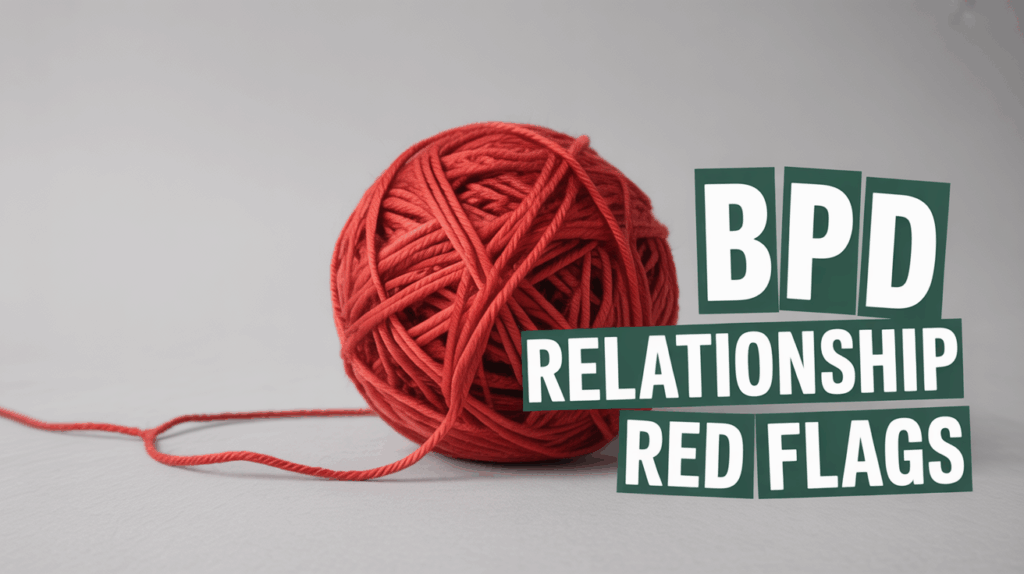BPD and Gaslighting
Understanding BPD and Gaslighting
BPD and gaslighting often appear together in conversations about relationships, abuse, and mental health. Gaslighting is a form of manipulation where someone makes another person question their memory, perception, or reality. Borderline personality disorder (BPD) involves intense emotional dysregulation, unstable relationships, and fears of abandonment, which can complicate how gaslighting is experienced.
For people with BPD, emotions such as anxiety, fear, anger, and shame often feel overwhelming. When gaslighting occurs in these relationships, it can trigger deep feelings of instability and confusion. The cycle of abuse becomes harder to break when manipulation affects identity and sanity

.
What Gaslighting Looks Like in Relationships
Gaslighting is a psychological abuse tactic designed to create doubt. A partner might deny events, dismiss feelings, or insist that something never happened. This behavior gradually erodes confidence and creates pain, confusion, and paranoia.
In marriage or couples therapy, many describe gaslighting as the most damaging form of abuse because it makes the victim question their own attention and memory. It can appear in domestic violence situations, bullying, and even within family systems where a parent undermines a child’s sense of reality.
Why BPD and Gaslighting Are Connected
People with borderline personality disorder often struggle with abandonment fears, intense moods, and unstable self-image. When exposed to gaslighting, these vulnerabilities can worsen, making them feel trapped in cycles of manipulation.
Gaslighting also overlaps with other personality disorders, like narcissistic personality disorder. Narcissism often fuels gaslighting behavior, while BPD increases the emotional sensitivity of the victim. This combination can lead to rage, grief, and emotional instability in relationships.
The Psychology Behind Gaslighting
Psychology defines gaslighting as a type of psychological abuse where manipulation distorts perception and reality. The abuser gains power while the victim loses confidence and empathy for themselves. Over time, this leads to stress, dissociation, and a breakdown in sanity.
Psychiatry views gaslighting as a dangerous pattern that can contribute to mood disorders, addiction, and even suicidal ideation. Victims may experience paranoia, social anxiety, and ongoing fear in daily life. These psychological effects mirror trauma responses seen in domestic violence and bullying.
Emotional Impact of Gaslighting with BPD
For someone living with borderline personality disorder, gaslighting feels like repeated emotional attacks. BPD already involves unstable moods, emotional dysregulation, and identity struggles. Gaslighting adds confusion, instability, and shame to an already painful experience.
The emotional fallout often includes rage, grief, and sadness. Victims may experience dissociation or withdraw from relationships out of fear. The pain of manipulation intensifies BPD symptoms, feeding cycles of instability and abandonment fears.

Gaslighting in Domestic Violence and Abuse
Domestic violence frequently includes gaslighting as a psychological weapon. An abuser may minimize violence, deny substance abuse, or manipulate facts to protect their behavior. The cycle of abuse then traps the victim in fear and dependency.
For someone with BPD, the trauma of domestic violence and gaslighting can worsen symptoms of emotional dysregulation, anxiety, and depression. Abuse creates an experience where coping feels impossible, leaving the victim vulnerable to further manipulation.
Coping with Gaslighting and BPD
Coping with gaslighting requires awareness, boundaries, and mental health support. People often benefit from therapy with a mental health professional who can validate feelings and rebuild confidence.
Dialectical behavior therapy (DBT) is especially effective for those with borderline personality disorder. DBT teaches distress tolerance, emotional regulation, and mindfulness skills that strengthen sanity and resilience. Couples therapy can also be useful in cases where both partners want to break unhealthy cycles of manipulation.
The Role of Therapy and Mental Health Treatment
Therapy provides tools for coping with gaslighting while managing BPD symptoms. A therapist helps patients rebuild identity, challenge false narratives, and process grief and pain. Therapy also supports coping with stress, social anxiety, and paranoia that follow psychological abuse.
Mental health professionals often recommend dialectical behavior therapy as a structured approach for emotional dysregulation. Psychiatry may also use medications for co-occurring conditions like bipolar disorder, mood disorders, or addiction. This combination of therapy and psychiatry strengthens long-term mental health.
How Revival Mental Health Can Help
Revival Mental Health offers specialized treatment for borderline personality disorder and the lasting effects of gaslighting and abuse. Our clinicians use evidence-based therapies such as DBT to address emotional dysregulation, identity instability, and coping skills that help rebuild confidence and self-trust. You can learn more about DBT therapy for borderline personality disorder in our comprehensive guide.
We also provide couples therapy, trauma-focused care, and psychiatric support to treat both the psychological and emotional impact of manipulation. At Revival Mental Health, patients receive guidance from mental health professionals who understand the cycle of abuse and the importance of empathy, awareness, and healing.
Addiction, Substance Abuse, and Gaslighting
Substance abuse and addiction often appear in relationships involving gaslighting. A partner struggling with alcohol or drug dependence may gaslight others to hide their behavior. Denial, manipulation, and blame-shifting become tactics that fuel the cycle of abuse.
For people with borderline personality disorder, these experiences can trigger rage, shame, and instability. Substance abuse also increases the risk of violence, grief, and emotional pain in relationships. Treatment for both addiction and BPD often requires integrated therapy and support systems.
Dual Diagnosis and Substance/Alcohol Abuse
Many people living with BPD and gaslighting also struggle with dual diagnosis, where substance abuse and a personality disorder occur together. Alcohol and drugs often become coping mechanisms for pain, stress, and emotional dysregulation. Unfortunately, this makes symptoms worse and deepens the cycle of abuse.
Dual diagnosis treatment addresses both the mental health condition and the substance abuse at the same time. At Revival Mental Health, patients can receive therapy, psychiatric care, and support for addiction recovery. This integrated approach ensures that both BPD symptoms and substance use are treated to improve long-term health and stability.
How Gaslighting Affects Identity and Sanity
Gaslighting is designed to strip away a person’s identity, replacing confidence with doubt. Over time, victims may lose awareness of their own emotions, reality, and perception. This distortion affects memory, mood, and sanity.
For individuals with borderline personality disorder, this experience amplifies existing fears of abandonment and instability. They may question their feelings, dissociate from reality, or believe the abuser’s false narratives. The loss of empathy for themselves deepens emotional dysregulation.
Gaslighting, Parenting, and Family Systems
Gaslighting does not only occur in romantic relationships. Parents can manipulate children by denying abuse, minimizing bullying, or blaming the child for household conflict. This creates lifelong issues with trust, confidence, and mental health.
Children of parents with narcissistic personality disorder or borderline personality disorder may grow up in cycles of abuse where gaslighting is normalized. These experiences often lead to adulthood struggles with anxiety, rage, grief, and mood disorders.
Breaking the Cycle of Abuse
Breaking the cycle of abuse requires recognition, awareness, and intervention. Therapy offers a safe space to rebuild perception and identity. DBT skills like distress tolerance and mindfulness help people regulate mood and emotions while restoring confidence.
For some, couples therapy helps rebuild trust in marriage when both partners commit to change. In cases of domestic violence, however, safety and separation are often necessary steps to end gaslighting and protect health.
Finding Empathy and Healing After Gaslighting
Healing after gaslighting is a gradual process. Victims must rebuild empathy, sympathy, and confidence. This includes learning to trust feelings, regain awareness of reality, and strengthen coping skills.
For those with borderline personality disorder, healing also means addressing emotional dysregulation, fear of abandonment, and mood instability. With therapy, psychiatry, and support, recovery is possible. Over time, victims learn to manage stress, pain, and grief while reclaiming identity and sanity.

The Evidence for Treatment and Recovery
Evidence supports therapy, especially dialectical behavior therapy, for treating borderline personality disorder and the aftermath of gaslighting. Studies in psychology and psychiatry show DBT reduces emotional dysregulation, instability, and self-destructive behavior.
Mental health professionals highlight the role of coping skills, social support, and awareness in recovery. Evidence also shows integrated care that addresses both substance abuse and personality disorder improves long-term outcomes. Recovery is not easy, but it is possible with the right support.
FAQs
1. Can gaslighting cause long-term memory problems? Yes, repeated gaslighting can affect memory by creating ongoing doubt and confusion. Victims may struggle to trust their perception of events.
2. Is gaslighting always intentional manipulation? Not always. Some people use gaslighting behaviors unconsciously, but the effect on the victim remains psychological abuse and emotional harm.
3. How does gaslighting affect children in a family system? Children exposed to gaslighting often grow up with anxiety, low confidence, and trust issues. They may also carry patterns of manipulation into adulthood.
4. What is the difference between gaslighting and lying? Lying involves hiding the truth, while gaslighting aims to distort reality. Gaslighting systematically erodes perception, sanity, and confidence.





